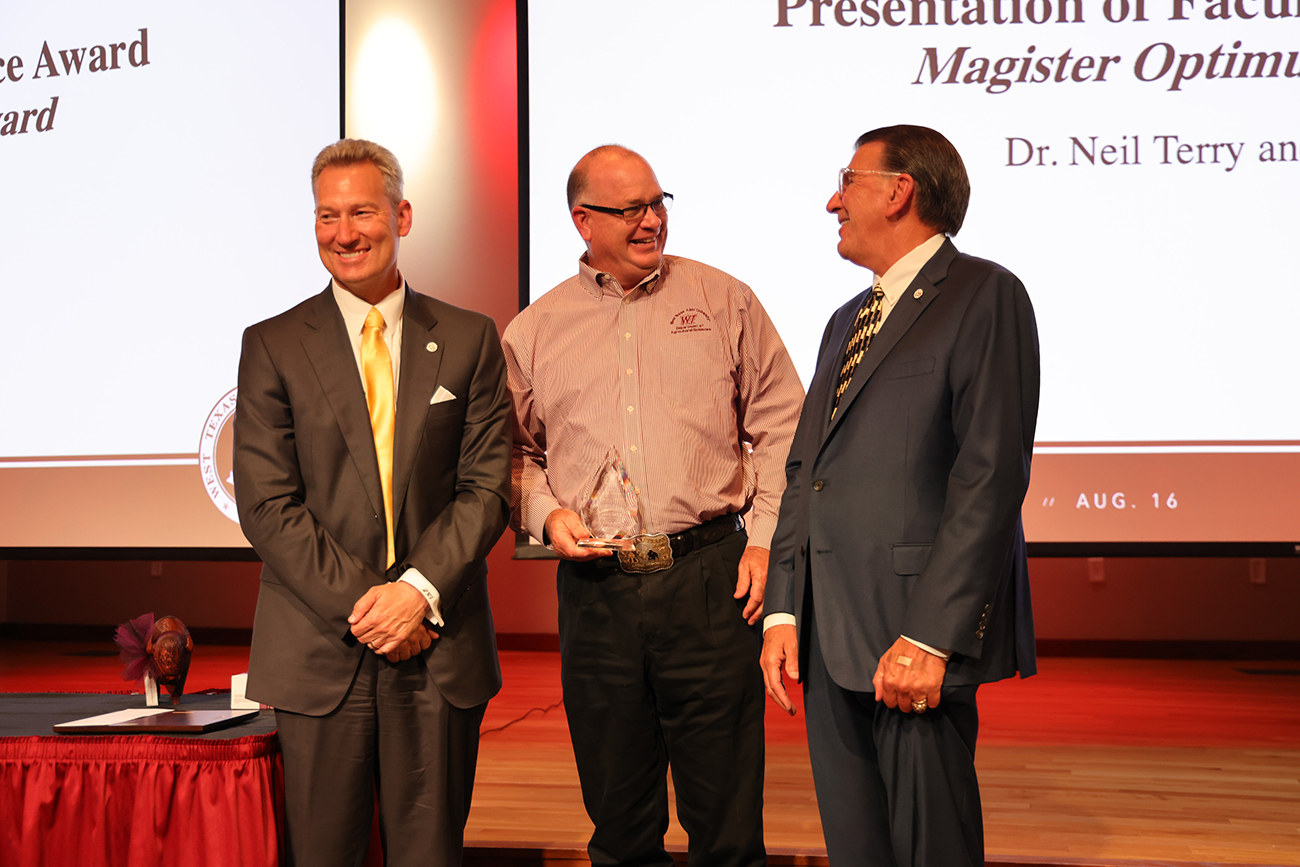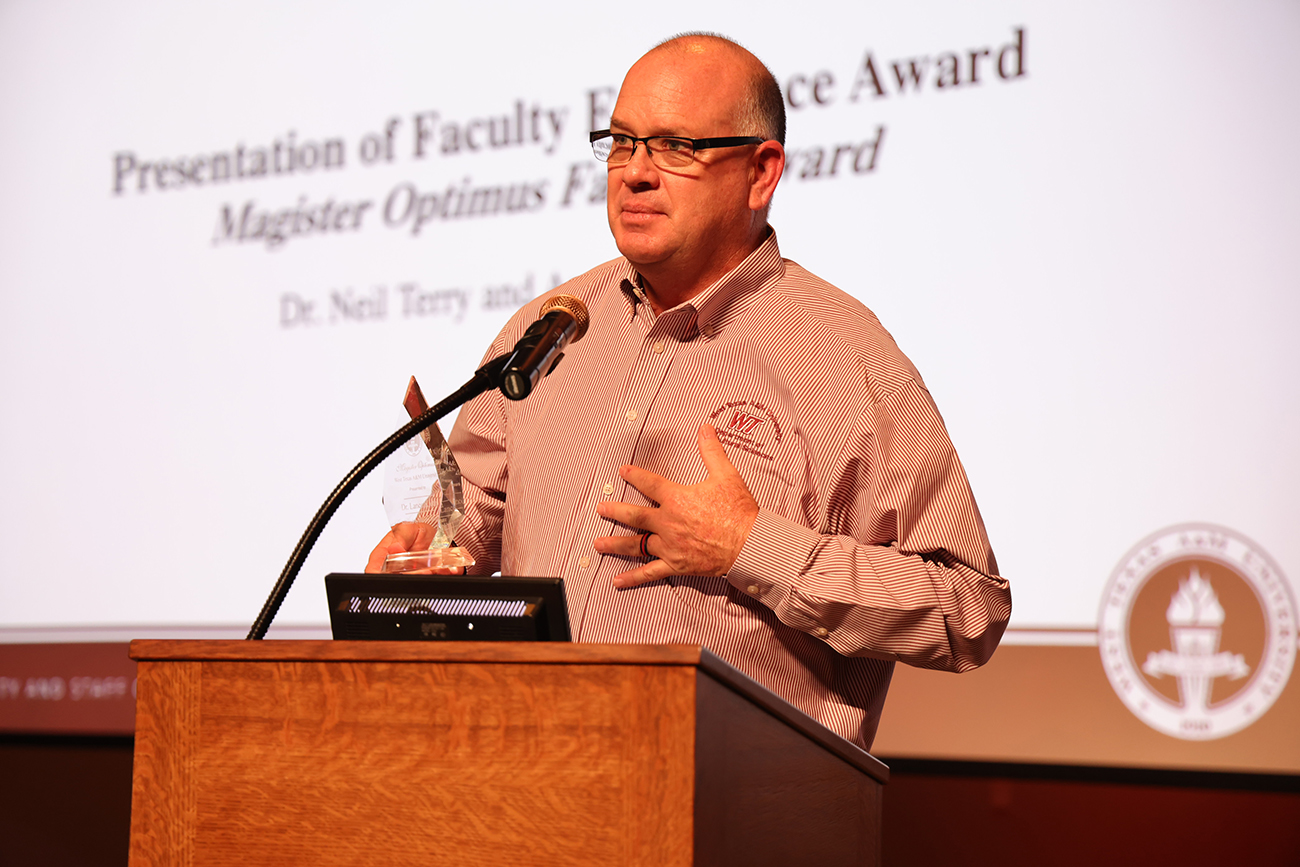- Agriculture
- Jon Mark Beilue
- Featured
Jon Mark Beilue: Riding for the Buffalo brand
Kieth, Magister Optimus winner, preaches worth of ag education
Lance Kieth was still a student, trying to finish up his bachelor’s degree in agriculture education at Texas Tech in 1989. He and some others were on a field trip to the Lubbock County livestock show when a stranger walked up to him.
“Are you Lance Kieth?” he asked.
As Kieth nodded, the man said, “Good. You’re going to work June 1 as the Lubbock County assistant county agent.”
That was the end of the surprise job interview. The man was Bob Robinson, South Plains district director for county extension agents. As others could have told Kieth, it would have been a waste of time to argue otherwise.
It would not be the last life-altering meeting with Robinson. In the summer of 2001, Robinson called Kieth, by then an ag education professor at Texas Tech with a joint appointment with the Texas Agri-Life Extension Service. He was asked to meet him at a livestock show in Plainview. WT was going to restart its agriculture education program that had been dormant for years.
Robinson, already a distinguished alumnus of WT, was also a professor of agriculture. Who, Robinson asked, would be good for that job? Being honest, Kieth said he would be, but he was happy doing what he was doing so he would try to think of someone. To no one’s surprise, there would not be a someone. About six months later, in January 2002, Dr. Lance Kieth began his new job at WT.
Nearly 20 years later, longer than he foresaw being at the university, Kieth, professor of agricultural education and head of the Department of Agricultural Sciences, received the Magister Optimus Award in mid-August at WT’s convocation ceremony. The Magister Optimus Award is given by WT’s Faculty Senate and considered the highest honor for a WT faculty member.
“His classroom is always active and engaging, and he inspires students to achieve their best,” said Anne Medlock-Ely, professor of theatre-costume design and president of the Faculty Senate. “Over his career, he has taught thousands of students in the art of teaching, and those students have gone on to represent WT at the highest of levels.”

Photo: Dr. Lance Kieth, center, celebrates after being announced as the 2021 Magister Optimus, the highest award given to West Texas A&M University faculty. Flanking him are Dr. Neil Terry, left, provost and executive vice president of academic affairs, and University President Walter V. Wendler, right.
Kieth had to start somewhere. Eight students signed up for ag education in January 2002. At the end of the first semester, seven of those eight appeared to be majoring in Advanced Partying. They had a combined GPA of 2.1 — and that was with one of them carrying a 4.0.
“I thought, ‘Man, what did I get into?’ We didn’t really have a curriculum or much in facilities,” Kieth said. “The eight of us had a little talk. We rallied the troops. We got motivated and set expectations.”
Kieth could probably see a little of himself at one time in those eight. He graduated from New Home High School, a small community 15 miles south of Lubbock. His dad was a cotton farmer, a grandfather was a former mayor.
Kieth was part of a strong Future Farmers of America (FFA) organization in high school. It was a long list of New Home students whose livestock excelled at major shows across Texas.
“It was an integral part of school for us,” Kieth said. “You hear how football is king in small towns. In the community I grew up in, agriculture was king to the point you missed football or basketball games for livestock shows or FFA events. We didn’t have many kids, so if you missed a game, you might struggle to have a team that night.
“It was just a powerful allegiance in that community. That’s what gave me a love for teaching ag and a passion for students.”
‘WOO-ing’ ag students to WT
In the 1980s, not many from New Home went to a traditional college. In fact, Kieth was the only one from his graduating class to immediately go to college. He spent two years at Angelo State University where his academic struggles almost mirrored those first eight students at WT.
With his future at a crossroads, Kieth transferred closer to home to Texas Tech. He got serious about life and his livelihood. He got a degree in ag education from Tech in 1989, a master’s in the same field from Texas State two years later, and a doctorate in education curriculum and instruction from Tech in 1997.
“That’s where I really honed in and loved the craft,” he said. “I’ve always seen myself as an educator. Showing animals and building barbecue pits are vehicles to educating kids to be productive members of society or to go to work in the ag industry.”
Those early years at WT spent reviving a program that had been dormant since the 1960s were often catch as catch can. They borrowed a little bit here and there from different facilities. While equipment and space may have been limited, enthusiasm and a vision were not. Those eight students swelled to more than 100 in only four years.
It came down to recruiting. First, Kieth had the path. Initially, he was only a quarter-time employee at WT. The rest of the time was spent with the Texas Education Agency, where his job was to mentor and shepherd new vocational agriculture teachers in a huge area that stretched from the Panhandle to Lubbock and east to the Dallas area.
“I used those trips to talk with high school students, too, about WT and tell them what we were doing and going to do,” he said. “I told them that they would be educated at a high level and immersed in hands-on training. So, when you become an ag teacher, it’s ‘been there, done that’ through our academic program.”
Secondly, Kieth had the skill set to recruit. Selling students on a budding ag education curriculum was like breathing. New instructors at WT go through a Strength Finders assessment program to determine top personality strengths. Kieth was far and away a “WOO” – Winning Others Over.
“For others, something like that may not be what they enjoy, but for my personality, it was my calling,” Kieth said. “It was like being a Wal-Mart greeter. I think I’m good at getting people to ride for the brand and move on to the next person.”
Kieth teaches courses in ag education and leadership. He has developed several curriculums, including “Teaching Effectiveness for County Extension Agents,” and “Quality Counts,” a youth livestock curriculum.
“My passion has always been ag education, teaching others employable skills and helping in team leadership through 4H and FFA,” he said. “Sometimes I think we lose sight of that in vocational training, or now ‘career and technology’ in the public schools. Sometimes we want to win banners rather than teach employable skills.
“That may be the most important program in a school system because what is the purpose for students? What is the outcome? Is it to be learned and enlightened? Yes, but it’s also to have skill sets to put hands on the plow, to earn a good living and be a productive member of society. That should be the end game – show me what you’ve learned.”
The change in the early years of the 21st century when Kieth arrived to what is available now is dramatic — not just in students, but facilities. Since 2018, $48 million has been invested in 224,000 square feet of facilities — the Happy State Bank Academic and Research Building, the Bain Event Center and the Piehl-Schaeffer Pavilion for the Paul Engler College of Agriculture and Natural Sciences.
“Oh my gosh, we have a saying that if we can just get prospective students on campus and in these buildings, we have them,” Kieth said. “We do things at a high level. Those are still inanimate objects, but when you have the facilities and faculty and good solid people, it’s a win-win.”
Kieth, for his part, was recognized by his colleagues for his instruction and passion for students with the Magister Optimus honor.
“It’s humbling,” he said. “I don’t know if I deserve this, but I’m so appreciative. This is an award my peers voted on, and that in itself gives me confidence. When peers award this, it’s validation. I’ve seen the kind of people who’ve received this before, so when I received it, it gave me a boost, like I’m doing OK.”
Do you know of a student, faculty member, project, an alumnus or any other story idea for “WT: The Heart and Soul of the Texas Panhandle?” If so, email Jon Mark Beilue at jbeilue@wtamu.edu.

